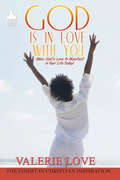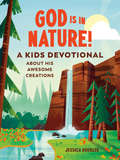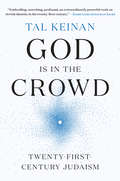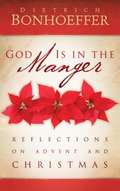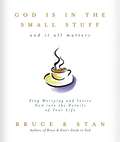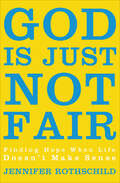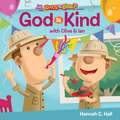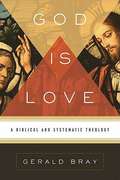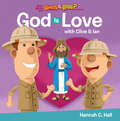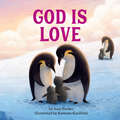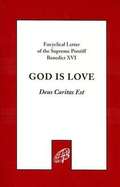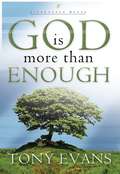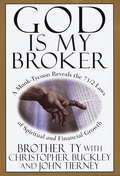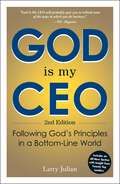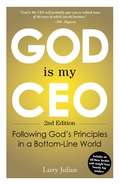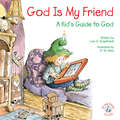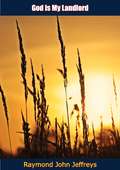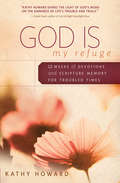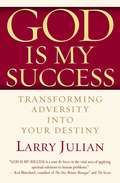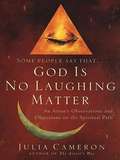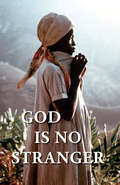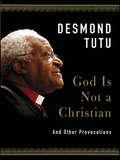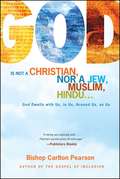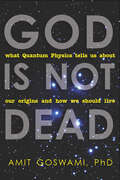- Table View
- List View
God Is in Love with You
by Valerie LoveGod Is In Love With You presents a radically transformative spiritual perspective: God is head over heels in love with you and will stop at nothing to express it in every moment of every day, and in every circumstance. Realizing our own capacity to connect with God's unconditional love creates an opportunity for blissful living. There is nothing love cannot heal, no matter how traumatic. This book offers a creative blend of scripture, inspirational quotes, and examples of God's loving presence in our everyday lives. With these lessons, readers will learn to consciously connect with the healing power of God's love and grace like never before, to live a divinely wondrous life. Let God Is In Love With You inspire you to develop and nurture a loving relationship with the Creator.
God Is in Nature!: A Kids Devotional About His Awesome Creations
by Jessica DoeblerThe only kids nature devotional featuring Scripture, Bible studies, and prayers that collectively teach children to praise God by appreciating nature and His awesome creations In this exciting and inspiring kids devotional, children will learn firsthand about God&’s fascinating world and amazing creations. From reading God&’s words in the Bible to getting outside and being captivated by the highest mountain and the tiniest fish, kids ages 6−10 will connect with God in fun and engaging ways. The Bible tells us about the story of creation and the amazing things that God can do. From rainbows and waterfalls to deserts and a starry night, God&’s miracles surround us, and they are undoubtedly awesome and cool. •100 kids devotions, organized by locale—accessible places like fields and parks; rivers, oceans, and lakes; and forests and mountains—offer opportunities for immediate exploration.•Prayers help kids slow down and appreciate what&’s in front of them.•Stunning illustrations capture a glimpse of the beauty and wonder that awaits the reader outside and creates the perfect gift package for those looking for a beautiful and meaningful Christian book for kids.•Less screen time with activity tips that encourage kids to get outside and see nature.
God Is in the Crowd: Twenty-First-Century Judaism
by Tal KeinanA bold proposal for discovering relevance in Judaism and ensuring its survival, from a pioneering social activist, business leader, and fighter pilot in the Israeli Air Force.God Is in the Crowd is an original and provocative blueprint for Judaism in the twenty-first century. Presented through the lens of Tal Keinan's unusual personal story, it a sobering analysis of the threat to Jewish continuity. As the Jewish people has become concentrated in just two hubs--America and Israel--it has lost the subtle code of governance that endowed Judaism with dynamism and relevance in the age of Diaspora. This code, as Keinan explains, is derived from Francis Galton's "wisdom of crowds," in which a group's collective intelligence, memory, and even spirituality can be dramatically different from, and often stronger than, that of any individual member's. He argues that without this code, this ancient people--and the civilization that it spawned--will soon be extinct. Finally, Keinan puts forward a bold and original plan to rewrite the Jewish code, proposing a new model for Judaism and for community in general.Keinan was born to a secular Jewish family in Florida. His interest in Judaism was ignited by a Christian minister at his New England prep school and led him down the unlikely path to enlistment in the Israel Air Force. Using his own dramatic experiences as a backdrop, and applying lessons from his life as a business leader and social activist, Keinan takes the reader on a riveting adventure, weaving between past, present, and future, and fusing narrative with theory to demonstrate Judaism's value to humanity and chart its path into the future.
God Is in the Crowd: Twenty-First-Century Judaism
by Tal Keinan“Enthralling, searching, profound, an extraordinarily powerful work on Jewish identity in the twenty-first century.”—Rabbi Lord Jonathan SacksA bold proposal for discovering relevance in Judaism and ensuring its survival, from a pioneering social activist, business leader, and fighter pilot in the Israeli Air Force God Is in the Crowd is an original and provocative blueprint for Judaism in the twenty-first century. Presented through the lens of Tal Keinan’s unusual personal story, it a sobering analysis of the threat to Jewish continuity. As the Jewish people has become concentrated in just two hubs—America and Israel—it has lost the subtle code of governance that endowed Judaism with dynamism and relevance in the age of Diaspora. This code, as Keinan explains, is derived from Francis Galton’s “wisdom of crowds,” in which a group’s collective intelligence, memory, and even spirituality can be dramatically different from, and often stronger than, that of any individual member’s. He argues that without this code, this ancient people—and the civilization that it spawned—will soon be extinct. Finally, Keinan puts forward a bold and original plan to rewrite the Jewish code, proposing a new model for Judaism and for community in general. Keinan was born to a secular Jewish family in Florida. His interest in Judaism was ignited by a Christian minister at his New England prep school and led him down the unlikely path to enlistment in the Israel Air Force. Using his own dramatic experiences as a backdrop, and applying lessons from his life as a business leader and social activist, Keinan takes the reader on a riveting adventure, weaving between past, present, and future, and fusing narrative with theory to demonstrate Judaism’s value to humanity and chart its path into the future.Advance praise for God Is in the Crowd“Beautifully written, brilliantly argued, this is a unique contribution to the conversation and a must read for anyone concerned with Tribal continuity.”—Yossi Klein Halevi, author of Letters to My Palestinian Neighbor“God Is in the Crowd blends social science, economics, religion, and national identity to help us see more clearly who we are as individuals, people, and a society.”—Dan Ariely, author of The Upside of Irrationality“American, Israeli, entrepreneur, fighter pilot, and investor: Keinan’s diagnosis of Israel and the Jewish Diaspora is provided through the lens of a rich and gripping life story. Keinan’s contribution is indispensable to the debate about the future of the Jewish people.”—Dan Senor, co-author of Start-up Nation
God is in the Manger: Reflections on Advent and Christmas
by Dietrich Bonhoeffer"There are only two places where the powerful and great in this world lose their courage, tremble in the depths of their souls, and become truly afraid. These are the manger and the cross of Jesus Christ. " "No priest, no theologian stood at the cradle of Bethlehem. And yet, all Christian theology finds its beginnings in the miracle of miracles, that God became human. " These stirring words are among forty devotions that guide and inspire readers as they move thematically through the weeks of Advent and Christmas, from waiting and mystery to redemption, incarnation, and joy. Supplemented by an informative introduction, short excerpts from Bonhoeffer's letters, and passages from his Christmas sermons, these daily devotions are timeless and moving reminders of the true gift of Christmas.
God Is in the Small Stuff and It All Matters
by Bruce Bickel Stan JantzBruce and Stan's newest book encourages readers not to disregard the minor, insignificant things in life. Rather, "God Is in the Small Stuff..." encourages a better understanding of God's infinite character, reminding readers that He is a personal and intimate God, involved in every detail of their lives, however minute. "God Is In the Small Stuff... and it all matters" contains 40 chapters, with titles such as "Remember that God Loves You," "Discipline Yourself (No One Else Will)," and "Contentment Won't Kill You." Each chapter includes an introductory commentary in the tongue-in-cheek Bruce & Stan style, followed by bits of pithy and sometimes humorous wisdom.
God Is Just Not Fair: Finding Hope When Life Doesn't Make Sense
by Jennifer Rothschild"This is a book I'll be recommending for years to come." -- Lysa TerKeurst, New York Times bestselling authorDo you believe God is just not fair?If you're like Jennifer Rothschild, you wrestle with questions when you experience painful circumstances.Does God care? Does he hear my prayers? Is he even there?Blinded as a teenager, Jennifer overcame daunting obstacles, found strength in God, and launched a successful speaking and writing ministry. Then in her 40s, everything changed.Jennifer hit a wall of depression and discontent that shook her to her core, undermining many of her past assumptions about her faith. She wondered who God was and why he continued to allow her to struggle and doubt. Where, she pleaded, is his hand of healing and hope in my life now?This is a book about finding more than just answers. It's for anyone who needs hope when life doesn't make sense--for all who reach for a God who feels distant. As Jennifer tackles the six big questions of faith, she will help you:Trust God more than your feelings.Strengthen your faith when you feel beat up by life.Embrace your obstacles and start experiencing their purpose.Face your disappointment and grow stronger from your loss.
God Is Kind
by Hannah C. HallFeaturing beloved characters Clive & Ian from the bestselling video series What's in the Bible?, GOD IS KIND weaves the biblical truth of God's kindness into a fun story with delightful illustrations, teaching little learners that God is kind and loves them. Clive, you are so kind.You hardly ever mindWhen I carry lots of rocksIn your favorite pair of socks...It's Clive's birthday! So, Ian writes a special poem to celebrate his kind big brother. Then Clive helps Ian understand that God is kind, too, and how He shows it in all the good things he does for them.
God Is Love: A Biblical and Systematic Theology
by Gerald BrayWhile there is no substitute for personal, faithful, and careful Bible reading and prayer, the Bible's vast size and diversity can make distilling its truth a daunting task. Thus most Christians benefit from supplemental resources to help learn and apply what Scripture teaches. Renowned theologian, Gerald Bray has produced just such a resource in his new systematic theology. Though packed with robust content, he writes about this volume: "the aim . . . is to reach those who would not normally find systematic theology appealing or even comprehensible. " This volume is unique from others in that Bray traces the common theme of God's love through the Bible categorically--from God's love for himself and his creation to the cross as the ultimate expression of God's love, among other categories. The centrality of God's love in Bray's theology reflects a deep conviction that the Bible shows us God for who he really is. This volume will be of interest to Christians seeking to grow in their faith.
God Is Love
by Hannah C. HallFeaturing beloved characters Clive & Ian from the bestselling video series What's in the Bible?, GOD IS LOVE weaves the biblical truth of God's love into a fun story with delightful illustrations, teaching little learners how much God loves them."Clive," Ian asked, "does God love us as much as Grandma loves us?"Clive and Ian's grandma is coming for a visit! Grandma's visits are fun, because she loves the brothers so much. Before she arrives, the boys consider that God loves them even more than Grandma does, and that's a lot! So, Clive and Ian decide they want to show God's love to everyone they meet!
God Is Love (God Is Series)
by Amy ParkerLittle ones will feel God's eternal love in this charming holiday-themed book in a brand-new series by bestselling author Amy Parker. God Is Love provides young children with the comfort of knowing God always loves them, no matter the day, time, season, or year, in this charming, sweet, and heartfelt book. With warm, rhyming verse, bestselling author Amy Parker reassures young hearts by introducing them to the awesome characteristics of an Almighty God. With a soft-focus on Valentine's Day, Parker's book offers reminders of how God's love is everlasting during this very special season while also hinting that His love is unwavering year-round. Part of a series, God Is Love is sure to be read and cherished all year long.
God Is Love/Dues Caritas Est: Encyclical Letter Of The Supreme Pontiff Benedict XVI
by Benedict XviPope Benedict's first encyclical seeks to show the place of love in the life of the Church, referencing her charitable activity and works of justice as expressions of love. Examining the natures of various kinds of love--human, divine, eros, friendship, and charity--he inspirationally writes that we were made for love by the God who is love, the God who became one of us out of love, and urges us to purify the love which has been abused in the modern world.
God Is More Than Enough (LifeChange Books)
by Tony EvansThe Lord is my Shepherd; I Shall Not Want. Psalm 23 is more than just a lovely poem; it is a profound description of the relationship God offers you. In this refreshing, exhilarating book by Tony Evans, you will discover anew one of the most beloved passages of Scripture--and the Shepherd who is more than enough to meet all your needs. When your spiritual energy is drained, He'll lead you to refreshment. When you're confused by the world around you, God will guide you onto the right path.When your life seems threatened by forces outside your control, God promises His protection. No matter how things appear, your Good Shepherd is constantly at work on your behalf, and you can rely fully on His goodness and mercy all the days of your life.From the Trade Paperback edition.
God Is My Broker
by Christopher BuckleyThis is an incredible story. The author, a failed, alcoholic Wall Street trader, had retreated to a monastery. It, too, was failing. Then, one fateful day, Brother Ty decided to let God be his broker--and not only saved the monastery but discovered the 7 1/2 Laws of Spiritual and Financial Growth. Brother Ty's remarkable success has been studied at the nation's leading business schools and scrutinized by Wall Street's greatest minds, but until now the secret to his 7 1/2 Laws of Spiritual and Financial Growth have been available only to a select few:
God is My CEO: Following God's Principles in a Bottom-Line World
by Larry Julianhis new edition explores the ten most common issues facing business people today and applies God's principles to these dilemmas. You will learn that leading by faith isn't just about feeling good--it's about building employee morale, increasing productivity, and fostering customer loyalty. In addition, the brand-new section Timeless Wisdom from Twenty Leaders provides insight and encouragement from top members of the business world, including Marc Belton of General Mills, Richard Stearns of World Vision U.S., and Ken Blanchard, author of The One Minute Manager.God Is My CEO, 2nd Edition will inspire you to become a game-changer in the business world as you continue on your path as a leader.
God Is My CEO: Following God's Principles in a Bottom-Line World
by Larry S. JulianMany business leaders struggle with the dilemma of being successful and living a life with purpose. God Is My CEO offers a practical and inspirational source of guidance for achieving a balanced and accomplished life.
God Is My Friend
by R. W. Alley Lisa O EngelhardtEveryone needs a best friend--someone who knows you and loves you just the way you are. Someone who hugs you when you're sad and celebrates when you're happy. Best friends like to spend time with each other. Best friends stay in touch and help each other out. This book introduces children to their very own Best Friend-God. Through childlike images and charming illustrations, it helps young believers to come to know God as an everyday, everywhere, anytime kind of Friend. A down-to-earth primer for children (and adults too!) on God.
God Is My Landlord
by Raymond JeffreysPerry Hayden was a Christian who wanted to prove that the law of tithing was in fact the divine law of prosperity. To prove his theory, he set up an experiment in 1940 where he planted one cubic inch of wheat seed. His intention was to tithe the tenth each year from the crop. American industrialist and business magnate Henry Ford became interested in this effort and lent his support by loaning Mr. Hayden farmland in Tecumseh, Michigan to plant on and equipment to harvest his crop with.GOD IS MY LANDLORD, which was first published in 1947 and was dedicated to Henry Ford, who had died in April of that same year, tells the sensational inside story how Perry Hayden and Henry Ford proved through their spectacular Biblical Wheat Experiment that it pays to tithe and share with the Lord.The book contains 32 pages of priceless pictures of Henry Ford taking part in this phenomenal demonstration as his last public activity, as well as many other celebrities from every walk of life. Members of almost every faith, color and creed took part in this world-famous six-year project, which made many Biblical truths a living reality
God Is My Refuge: Twelve Weeks of Devotions and Scripture Memory for Troubled Times
by Kathy HowardIn this daily devotional, Kathy Howard combines Scripture reading, insightful commentary, personal reflection, and Scripture memory to help women draw closer to God and experience his help in the midst of life's trials."In this world you will have trouble." Jesus said it and our life experiences prove it. From financial need and illness to loss and broken relationships, every Christian woman encounters difficulties. Most believe God can help, but many don't know where to go in the Bible to find the comfort, peace, andguidance he longs to give. God Is My Refuge provides the direction Christian women need to discover, understand, and apply the "ever-present help" that only God can give.Each devotional includes five components to guide readers through a well-rounded time with God. Through these components readers will havethe opportunity to hear from God through the Bible, understand biblical truths, apply these truths to their lives, respond to God in prayer, and equip themselves through Scripture memory.
God Is My Success
by Larry JulianGod Is My Success shows that your adversity holds the key to your destiny and the success God intended. God doesn't promise a life free of adversity. He does, however, promise to be with us in our adversity. As we partner with God to overcome our obstacles we discover that, ultimately, God Himself is our success. From pain, discover destiny. From financial slavery, discover financial freedom. From lack of confidence, discover courage. From distractions, discover God's whisper. From fear and worry, discover peace.
God is No Laughing Matter
by Julia CameronIn her national bestseller, The Right to Write, Julia Cameron took to task the mythology surrounding the writing life in our culture. Now, in God Is No Laughing Matter, Cameron delivers spiritual straight-talk that helps readers to refocus their spiritual experience and to recognize true inspiration. With her trademark "sparkling prose" (Publishers Weekly), combined with anecdotes and techniques presented in God Is No Laughing Matter, Cameron offers thought-provoking, humorous essays that paint the spiritual journey in a refreshingly clear light. Addressing the way spiritual "experts" have clouded the message, the book shows readers how instead they can better focus and make conscious choices that inform life, and enrich oneself and the community. Sharing firsthand observations on the influences of spiritual life on her work, Cameron asserts that, "for every step we take toward God, a thousand are taken toward us. " Today, with the prevalent paradoxes and contradictions one often finds in the spiritual trek, God Is No Laughing Matter will give readers a respite and the energy to begin anew.
God is No Stranger
by Wally Turnbull Eleanor TurnbullThis is a prayer book, but it is unlike many others you may have seen. This book is unique, not only because each prayer is accompanied by a striking photograph, but because each prayer is an example of sincere, heartfelt communication with God. These prayers of Haitian Christians converted from Voodooism reflect the paradoxically childlike yet deep faith of a mountain people who have come to know God as a Friend acquainted with their culture and daily lives. The photographs which accompany each prayer tells a story by itself.
God Is Not a Christian: And Other Provocations
by Archbishop Desmond Tutu"[ArchbishopDesmond Tutu’s] unofficial legacy will be his life and the story of how thistiny pastor with a huge laugh from South Africa became our globalguardian." —Time magazine Biographer John Allen collects the ArchbishopDesmond Tutu's most profound, controversial, and historic words in thisinspiring anthology of speeches, interviews, and sermons that have rocked theworld. An unforgettable look at the South African pastor’s deeply rootedempathy and penetrating wisdom, God IsNot a Christian is perfect for anyone moved by of Martin Luther King Jr.’s“I Have a Dream” speech or Nelson Mandela’s stirring autobiography Conversations with Myself, brilliantlyconnecting readers with the courageous and much-needed moral vision thatcontinues to change countless lives around the globe.
God Is Not a Christian, Nor a Jew, Muslim, Hindu...
by Carlton PearsonThe author of The Gospel of Inclusion continues to rouse organized religion as he raises controversial issues and provides enlightening answers to the deepest questions about God and faith. What is God? Where is God? Who is the one true God? Questions such as these have driven a thousand human struggles, through war, terrorism, and oppression. Humanity has responded by branching off into multiple religions, including Christianity, Judaism, Islam--each one pitted against the other. But it doesn't have to be that way.In God Is Not a Christian, nor a Jew, Muslim, Hindu . . . , the provocative and acclaimed Bishop Carlton Pearson follows up on his celebrated first book, The Gospel of Inclusion, to tackle these questions and many more, exploring new ideas about God and faith and putting forth the stunning assertion that God belongs to no particular religion but is an ever-loving presence available to all. For these beliefs, Bishop Pearson lost his thriving Pentecostal ministry but was catapulted instead into a greater pulpit. His readership has grown through appearances on national television and an extensive speaking schedule. With the world in the midst of a holy war, there is no better time for the wisdom of Bishop Pearson to reach a global audience.Bishop Pearson's many loyal fans, along with new readers, will surely welcome this provocative and eye-opening exploration of a deeper faith, one that goes far beyond any fundamentalist way of thinking, be it Christian, Jewish, Muslim, Hindu, etc. Simply put, Bishop Pearson dares to tell the truth so many others are too afraid to face.
God Is Not Dead: What Quantum Physics Tells Us About Our Origins and How We Should Live
by Amit GoswamiA “pioneering” physicist “shows how quantum reasoning may resolve deep mysteries, including the nature of God [and] evolution” (Beverly Rubik, PhD, Biophysicist, Institute for Frontier Science, Adjunct Professor, Saybrook).Move over, Richard Dawkins and Christopher Hitchens—a highly regarded nuclear physicist enters the debate about the existence of God—and comes down on the side of the angels. Goswami’s hypothesis is that quantum physics holds the key to all the unsolved mysteries of biology—the nature and origin of life, fossil gaps of evolution, why evolution proceeds from simple to complex, and why biological beings have feeling and consciousness.In God is Not Dead, Goswami moves beyond theory and shows how a God-based science puts ethics and values where it belongs: at the center of our lives and societies. He provides a scientific model that steers between scientific materialism and religious fundamentalism; a model that has implications for how we live both individually and collectively.God is Not Dead is a fascinating tour of quantum physics, consciousness, and the existence and experience of God.
